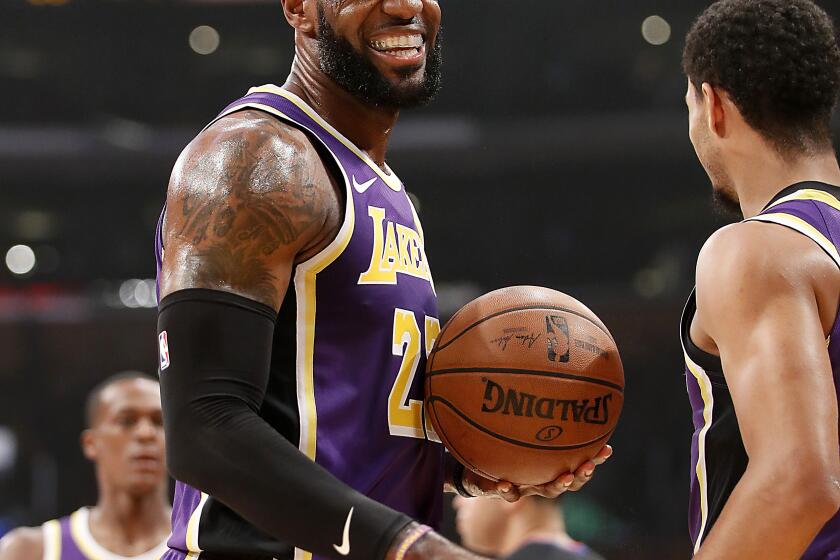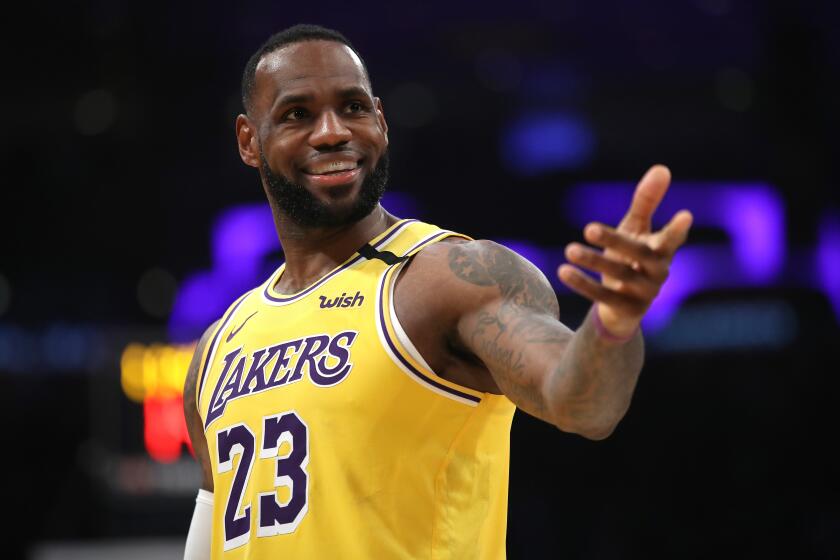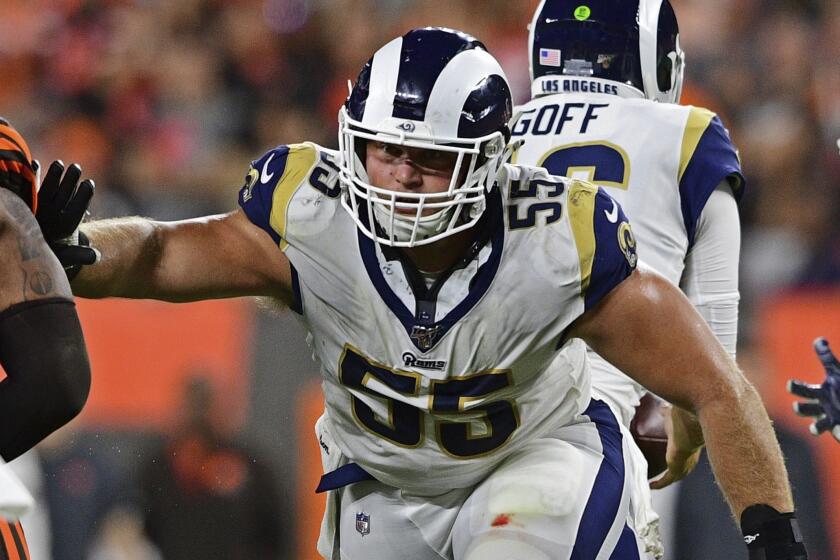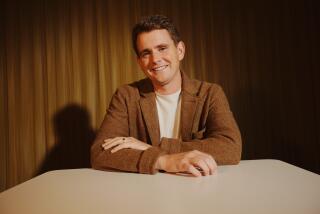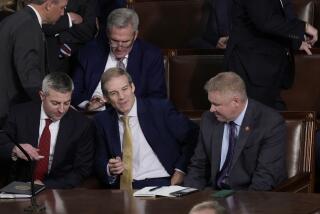Capturing Michael Jordan unfiltered is the best part of ‘The Last Dance’
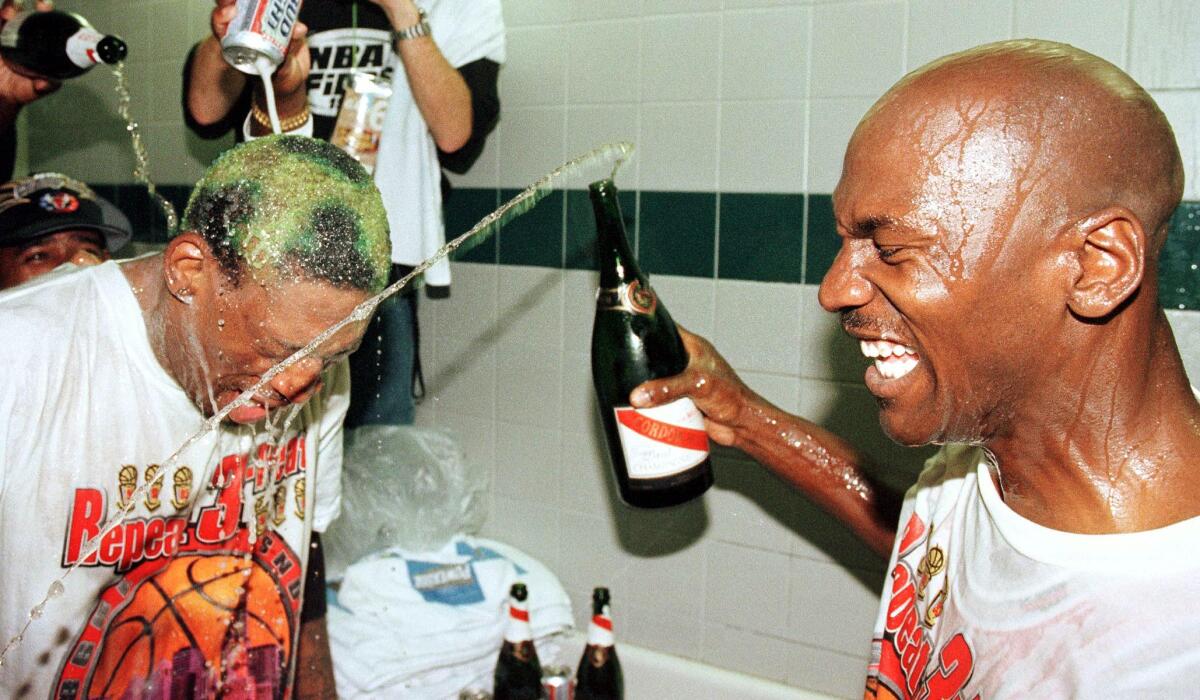
- Share via
Nearly seven hours into ESPN’s “The Last Dance,” Michael Jordan’s voice starts to crackle, the natural light in his waterfront mansion glistening off his reddening eyes.
Jordan’s been talking about how he is perceived — that along with being a winner, he was a tyrant, that along with being a champion, he was a jerk.
“It is who I am,” he says, capping his defense of himself.
Then, emotionally tired, he tells the filmmakers he needs a break.
For all the accomplishments of “The Last Dance” — of which there are many — getting Jordan to reveal and reflect, to delve into his own psyche while recounting his life story is the greatest and the most surprising.
Lakers star LeBron James was overwhelmingly voted as the favorite local athlete in a new survey, only a year after he was booed in Staples Center.
Since leading the Chicago Bulls to six championships, since putting $100 sneakers on the feet of children who wanted to “Be Like Mike,” since pitching sports drinks and underwear and cars and fast food, Jordan has faded from the spotlight, becoming the rare all-time great athlete comfortable with his voice largely exiting from the public arena.
Since retiring and moving into ownership, Jordan’s not been the kind of person to show up on set for a pregame show, to crack jokes with Charles Barkley or provide analysis. He doesn’t tweet. And he barely had any presence at the last two All-Star games (one in Charlotte, the team he owns, and the second in Chicago).
“I can’t answer [about] Michael kind of being in the background these days after being in the limelight his whole career. But I do know I’m excited for this movie because I think there’s a whole generation of young basketball players and fans who have only heard about Michael and didn’t really experience his dominance,” said Steve Kerr, coach of the Golden State Warriors and Jordan’s former teammate. “To really see it up close, to see the impact he’s had on the game, to see not only the physical, but the mental and emotional dominance he carried with him on the court every single game, it’ll be really interesting.”
ESPN’s ambitious 10-part documentary about the Chicago Bulls’ 1997-98 season — dubbed by coach Phil Jackson as the “The Last Dance” because squabbles with management made it clear that there would be no next year — leans heavily on never-before-seen footage captured by documentarians more than 20 years ago. But while seeing Jordan interact in locker rooms, seeing him drink postgame beers and smoke midday cigars is illuminating, it’s nothing like hearing him speak.
Los Angeles has seen the power he possesses first hand — his surprise eulogy for Kobe Bryant earlier this year commanded the attention of everyone inside Staples Center.
Michael Jordan timeline: A look at the Hall of Famer’s career.
As a player, Jordan’s words were largely reserved for opponents, teammates and management. And commercials. He drew criticism for not wading into political waters. Instead of publicly endorsing Harvey Gantt in a racially charged North Carolina Senate race in 1990, Jordan infamously said “Republicans buy sneakers too” — a remark that was more snark than credo.
But he doesn’t dodge stuff like that here, not in these interviews (Jordan addresses his “sneakers” quip). It’s why a mere acknowledgment of how race and racism played a role in his motivation for success feels so significant. It’s not packaged and clean.
He drops obscenities, verbally buries some former opponents (and teammates), all while trying to navigate the Bulls’ story with genuine self-reflection and emotion.
“As you’ll see in the series as it evolves, that limelight and that pressure … weighed heavier and heavier on Michael both on and off the court as his career continued,” the film’s director, Jason Hehir, said. “It was a lot to bear, to be responsible for the on-court performance of the Bulls and be one of the most prominent pop culture icons of the era.”
This is Jordan, though, doing the heavy lifting again because telling the story of the Bulls, who won a title each of the six times he participated in training camp in the 1990s, means you have to tell the story of Jordan.
The film, which debuts Sunday with the first two parts, is co-produced by multiple Jordan confidantes, with him giving notes and advice to filmmakers about his story. Hehir, though, said Jordan never censored them in the making of the film.
“From the moment I first sat down with Michael to discuss the project, he was surprisingly forthcoming, candid and eager to discuss a lot of the topics that I think people are going to be interested in,” Hehir said. “… He was all-in from Day 1. He was an active participant.”
Loyola Marymount asked Los Angeles residents to name their favorite athlete and favorite team. Who finished just behind LeBron James and the Lakers?
Jordan’s story includes gambling, $57,000 checks to golf hustlers and Atlantic City trips. It includes the murder of his father, multiple retirements and a maniacal desire to win at all costs, regardless of the fallout.
“I mean, I don’t want people to think he’s a bully. That he’s a mean guy,” former Bulls teammate Scott Burrell said. “He’s just driven to win. And there are no free rides, and I did not expect a free ride in Chicago.”
Burrell played one season with the Bulls — the one captured on film by NBA Entertainment camera crews. He was often the subject of Jordan’s barbs. On the court, Jordan ridiculed his game. On the team planes, he teased him about his partying, even comparing him to Dennis Rodman.
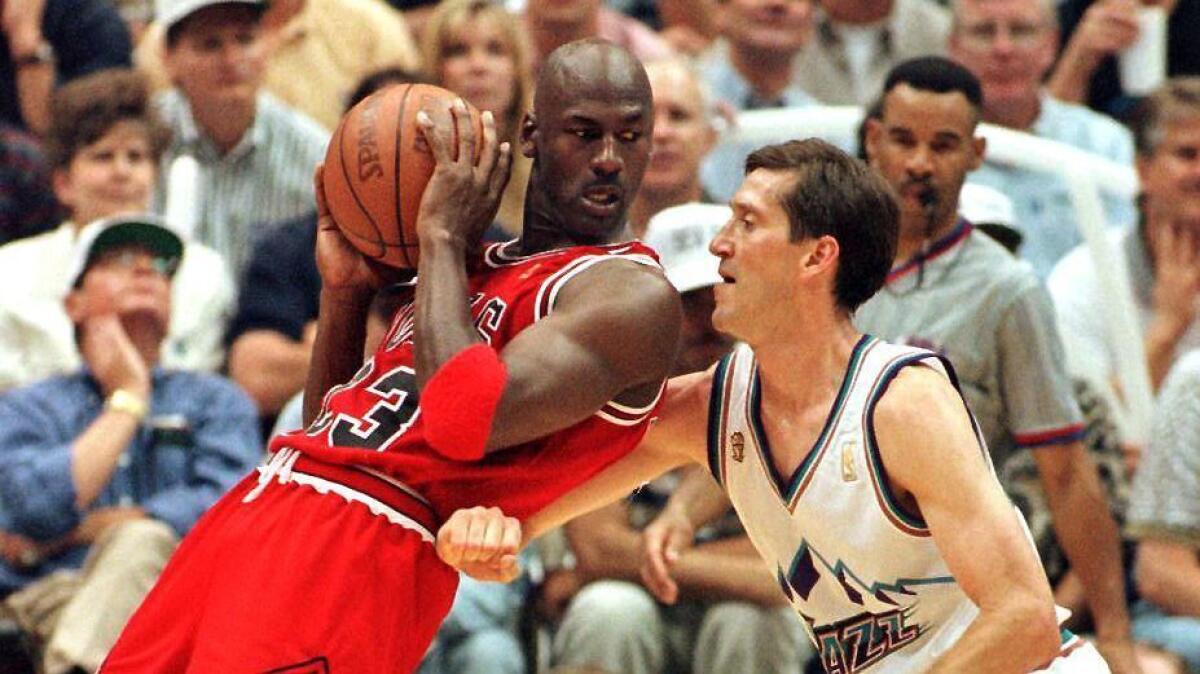
“Now,” Burrell said, “my wife calls me Baby Rodman.”
Jordan’s treatment of Burrell gets an examination in the film, and Jordan even reportedly worried about how that footage would make him look. But even those worries — relayed second-hand by the documentary’s filmmakers, showed the power of Jordan’s voice.
Burrell, now the basketball coach at Southern Connecticut State, said he’s spent the past two days doing interviews with outlets all over the world because of the story. (“I never knew how many different ESPNs there were,” he said jokingly).
“I texted [Jordan] yesterday, I said, thanks for making my life miserable right now,” Burrell said. “Three million things I have to do.”
A lot of people are going to be in similar positions, the people who Jordan talks about, the people he criticizes, the people he praises all again caught in the cultural tide that comes in when Jordan speaks.
Kerr knew this before he joined the Bulls — everyone who played basketball in the late ‘80s and early ‘90s did. It wasn’t just the NBA; it was rapidly becoming Jordan’s NBA. Joining with that kind of societal force came with massive pressure.
“He was larger than life at that point,” Kerr said. “He dominated the league in every way possible. It wasn’t just his play. It was his presence.”
Burrell remembers the feelings of not wanting to screw things up when he joined the Bulls, who were, at that time, winners of five of the last seven NBA titles.
A look at athletes, coaches and others in the sports world who have tested positive of the coronavirus.
“You’re nervous about playing with Michael Jordan, Scottie Pippen and Dennis Rodman and the coaching staff,” Burrell said. “I mean, obviously, they’re the peak of pro basketball at the time … you just don’t wanna be the guy that messes it up.”
“The Last Dance” conveys that pressure — the pressure on Jordan’s teammates, the pressure he put on the people around him to match his excellence. It also captures the pressure Jordan felt to match the idealistic image created by marketers capitalizing with him on his fame.
Winning, Jordan says in the film, comes with a price.
“From 35,000 feet, it’s easy. From 20 years later, it’s easy to see these teams as so dominant that it became simple for them to win,” Hehir said. “They won six out of eight years. ... Death, taxes and the Chicago Bulls are going to be in the Finals. I think what fans will see over the course of 10 hours of this program is that it was never easy, never simple.”
For the first time, we get to witness Jordan grapple with all of this, to sit in front of a camera and relive his successes, his failures and the cost of all of it.
“He’s a human being,” Hehir said.
Times staff writer Broderick Turner contributed to this report.
More to Read
Go beyond the scoreboard
Get the latest on L.A.'s teams in the daily Sports Report newsletter.
You may occasionally receive promotional content from the Los Angeles Times.

